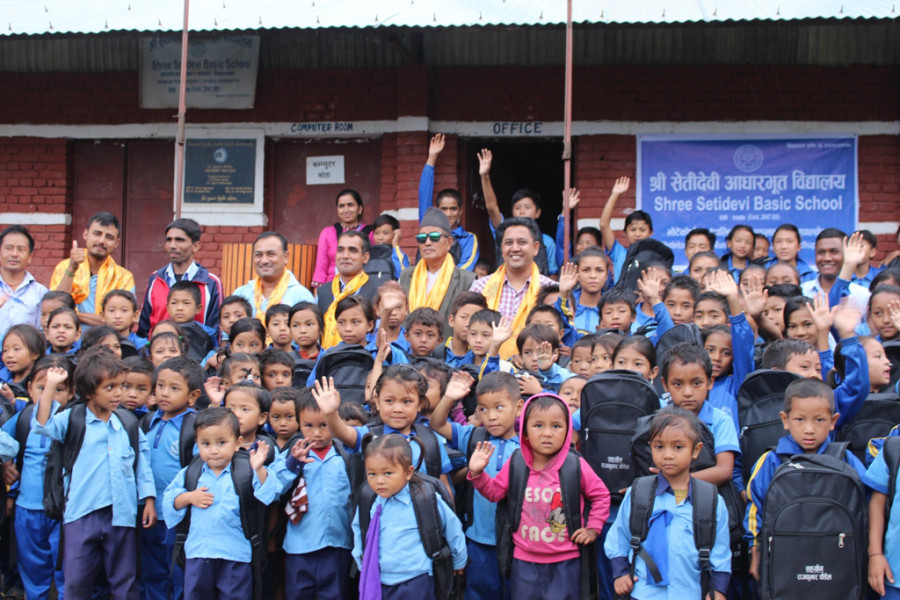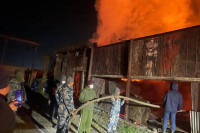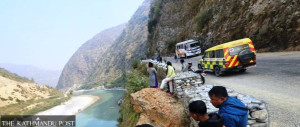Bagmati Province
Bhotekoshi Rural Municipality in Sindhupalchok starts teaching standard Mandarin in community schools
The locals from the villages along the Nepal-China border believe that learning the language will help them communicate better with those across the frontier.
Anish Tiwari
Two community schools in Bhotekoshi Rural Municipality, Sindhupalchok, have started teaching Putonghua (standard Mandarin), the official language of China, to its students from the current academic year.
The municipality office, its education section, the locals and the students unanimously agree on the importance of learning the said language since the municipality borders with China. “We rely on the Tatopani border for our day-to-day exchanges and the language barrier has made it difficult for us to communicate with those on the other side of the border,” said Dabuti Sherpa, the vice-chairperson of the rural municipality.
Read: Government has agreed to promote Mandarin in Nepali schools and not everyone seems pleased
Jhirpu Secondary School in Hindi bazaar and Kodari Secondary School in Kodari bazaar have introduced the course from pre-primary up to secondary levels. Raj Kumar Paudel, chairman of the rural municipality, said they have selected some of the schools in the northern border to start with. “The municipality has allocated Rs2.3 million for the Chinese language programme in the current fiscal year,” said Paudel.
Chinese Ambassador to Nepal Hou Yanqi, who inspected the Tatopani border after the opening of the border point, had assured the people’s representatives that the Chinese government would help in introducing Chinese language courses in schools in the bordering villages.
Naiendra Tamang, the coordinator at the Education Section of the rural municipality, said that the introduction of the language is in its preliminary phase and will be taught as a second language, as is done with English. “The rural municipality aims to offer this language course in all 29 community schools in the rural municipality. But, for the time being, we have started the programme in only two schools,” said Tamang. “We will also prepare the syllabus for the language course soon.”
Harishchandra Paudel, the headmaster of Gupteshwori Basic School in Dugunagaun, believes that learning the Chinese language will open more employment prospects for them. “The language course hasn’t started in our school yet, but parents, teachers and students are welcoming of the rural municipality’s initiatives,” he said. “We are looking forward to beginning the classes.”
The Bhotekoshi Rural Municipality is mostly inhabited by Tamang and Sherpa communities. The locals in the five wards of the rural municipality frequent the Tatopani border for trade and commerce purposes. “The schools have started to teach both Chinese and English languages from the pre-primary level onward,” said Paudel, adding that students currently speak three languages—modern Mandarin, English, and Sherpa.
The rural municipality has appointed two Chinese teachers each, in Jhirpu and Kodari. One of them, who is known by her first name, Lee, among her students in Kodari Secondary School, said she is currently teaching simple conversational language to the students. “I have started with the basics first; learning the language in its complete form is complex for new learners, so we are taking it one step at a time,” she said.
Suresh Tamang, a seventh-grader at Kodari Secondary School, said he and his classmates are excited to learn the Chinese language. “In the past, I had difficulty communicating with Chinese across the border but now I can not only understand them but also act as a moderator between Nepalis and Chinese,” said Suresh.
Dabuti Sherpa, the vice-chairperson of the rural municipality, said the rural municipality has been working to adopt quality, practical education in community schools. “We have been making efforts to upgrade not only the physical infrastructures of the schools but also create an open learning environment inside the classrooms,” said Sherpa.




 13.12°C Kathmandu
13.12°C Kathmandu














